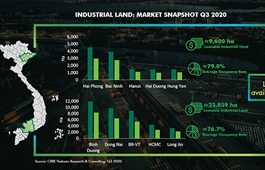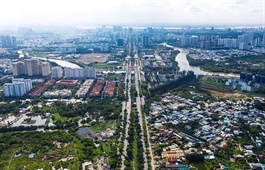Long Thanh property market expects to take off
Long Thanh property market expects to take off
The development of Long Thanh International Airport is expected to directly affect the real estate market in the southern province of Dong Nai and neighbouring areas. 
Nguyen Manh Ha, vice chairman of Viet Nam Real Estate Association (VNREA) and former Director of the Housing Management and Real Estate Market Department, told a conference held in Ha Noi on Thursday that Long Thanh District would be an important gateway for trade with major intersections of established and existing roads such as HCM City - Long Thanh, Dau Giay - Da Lat, Dau Giay - Phan Thiet and Bien Hoa - Vung Tau, that helps connect the province with HCM City and other areas quickly and conveniently.
In addition, Long Thanh was also preparing to develop the Bac Son - Long Thanh boulevard, which will be 60 metres wide with four lanes. This would be the axis of trade and service development from Bien Hoa to Long Thanh International Airport.
“When considering Long Thanh in the international airport network, with a “god-given” position in the heart of the airport system, it will definitely become the busiest airport in the Asia-Pacific region in the near future,” he added.
Tran Kim Chung, deputy director of the Central Institute for Economic Management, said the property market in Long Thanh and surrounding areas would receive great opportunities thanks to the airport project.
“The residential and industrial real estate market would see breakthrough development as factories producing goods transported by air would be built near the airport,” he said.
Expert Le Xuan Nghia said in the next 50 years, Long Thanh would be the No 1 urban development area, because there is no place left for land, with a beautiful location and many advantages in infrastructure and location. The National Assembly has also considered carefully the development of Long Thanh with potential to be able to develop on a regional scale. Therefore, a worthy plan is needed.
“Real estate developers should prepare a big capital source for long-term development in the area as they would have to develop their projects and invest in infrastructure, building roads and schools at the same time,” he added.
Vu Quoc Viet Nam, Senior Director of Dat Xanh Group, also said that there is a growing real estate market.
He said the investments of the Government and province in Dong Nai infrastructure is huge, not only for the short term in 10 years, but for 30 years. For example, HCM City - Long Thanh – Dau Giay Expressway, Ben Luc – Long Thanh Expressway, Dong Nai and Vung Tau are also studying to make expressways connecting the two provinces.
In addition, the Cai Mep Port cluster is also the largest in Viet Nam. That means Long Thanh Airport is the core for highways to connect to it. As such, there are two leading infrastructure projects in Long Thanh including an airport and a deep-water port, along with five highways and Cat Lai Bridge. The area has lots of potential.
An active market
A recent report by the Viet Nam Real Estate Research Institute showed that Long Thanh land plot is an attractive investment channel for investors. With the current relatively low land price of only VND20-30 million per square metre, the prices in the area near the airport would be able to reach VND100-120 million per square metre if infrastructure is developed.
The Long Thanh property market would increase despite the general fluctuations of the economy thanks to the airport planning information.
Economist Vu Dinh Anh said with its potential, Long Thanh could become the country’s, and region's, hub for logistics. The residential and industrial park real estate, as well as demand for offices, warehouses and trade centres, would also rise.
Vu Cuong Quyet, General Director of Dat Xanh Mien Bac Company, said the demand for housing in Long Thanh is currently continuing to increase and the liquidity in the market is at a high level.
According to planning, Long Thanh International Airport would serve 100 million passengers and five million tonnes of freight annually, with investment of VND336.63 trillion (US$14.51 billion) for three phases. In which, phase 1 with a capacity of 25 million passengers and 1.2 million tonnes of cargo per year will have a total investment of VND114.45 trillion ($4.9 billion).




























